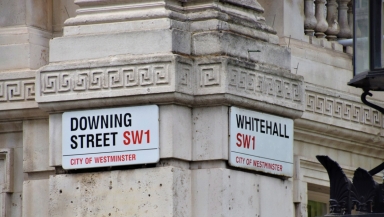
Things fall apart; the centre cannot hold.
That line comes from a poem by W.B. Yeats, 'The Second Coming'. Originally written in 1919 to describe post-war Europe, it seems very apposite now.
Liz Truss will go down in history as the shortest-serving prime minister. She has been in office for just 44 days.
The prime minister is humiliated, and the country is in turmoil. Speaking outside Number 10, she confirmed her resignation. A leadership election will be completed within the week, and the UK will have its fifth Conservative Prime Minister in just six years.
The last month has been a turbulent one. Days after Truss became PM, Queen Elizabeth II died after 70 years on the throne. Chancellor Kwasi Kwarteng then spooked the financial markets with his mini-budget. Three days later the pound hit an all-time low against the dollar.
What's our response to things falling apart – whether politically or on our own everyday frontlines?
Firstly, we should not be fearful. That is not a platitude. Ultimately, our significance and security is located in the God who has created us and revealed himself to us in Jesus Christ.
'God is our refuge and strength, an ever-present help in trouble,' writes the psalmist. 'Therefore we will not fear, though the earth give way and the mountains fall into the heart of the sea.' (Psalm 46:1-2)
Secondly, we should take responsibility for any mistakes we have made. We should admit when we've got it wrong and offer forgiveness to those who have as well.
Thirdly, we should make amends and act in ways that are redemptive for all concerned – our country, our party, our workplace, our community. Those who follow Jesus should always act in the way that is most redemptive in any given situation. That could involve resigning or simply speaking up for a colleague who has been overlooked.
And fourthly, we should pray for God's kingdom to come – that what God wants to be done is done.
It's not just the last month. The last six years have been turbulent. We are arguably witnessing the slow collapse of the political, economic, social, and cultural model that has underpinned our common life for a generation. In the words of Pope Francis, 'We are not living in an era of change but a change of era.'
And if that is correct, the importance of Christians engaging in redemptive action on their frontlines is only going to grow.
Paul Woolley is CEO of the London Institute for Contemporary Christianity (LICC). This article was first published on the LICC website and is printed here with permission.













